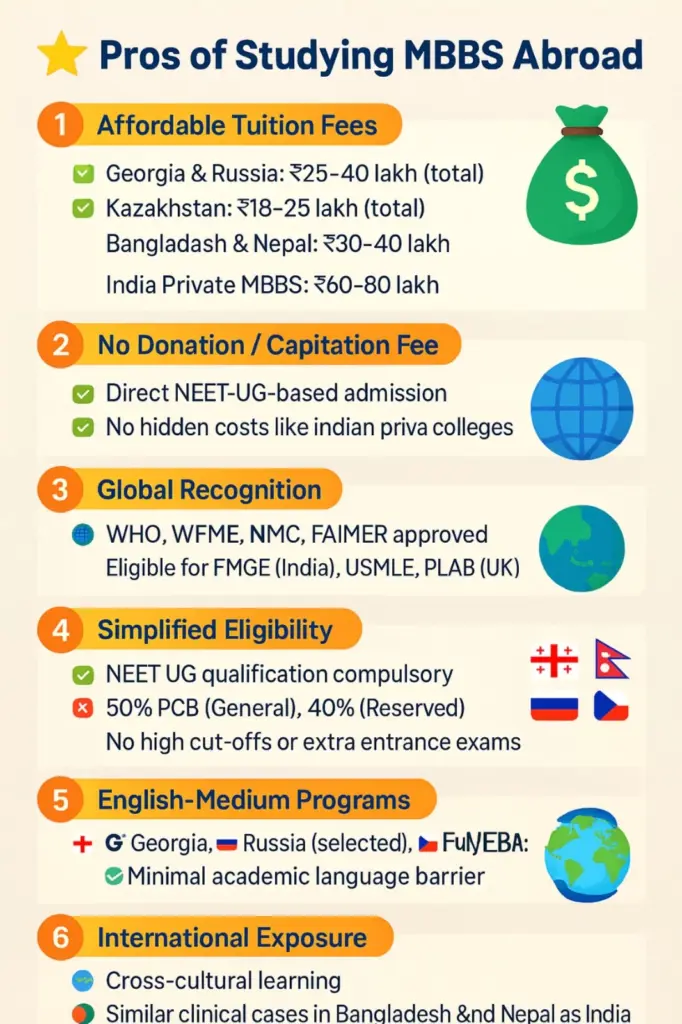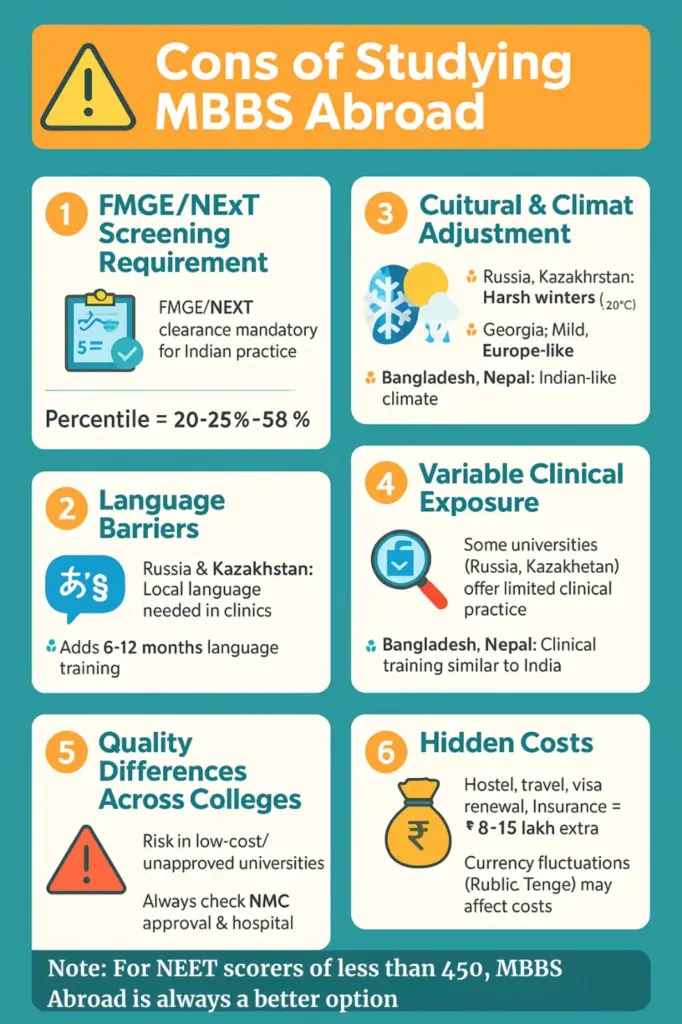Choosing a medical career is a life-changing decision, and selecting where to pursue your MBBS degree is equally important. Many students in India face the question: Should I study MBBS in India or go abroad? Both options have their pros and cons, and the right choice depends on factors like budget, entrance exam scores, career goals, and personal preferences.
In this article, we will compare MBBS in India and MBBS abroad in detail. We will discuss eligibility, cost, quality of education, future career prospects, and other key aspects so you can make an informed decision.
MBBS in India: Overview
MBBS (Bachelor of Medicine and Bachelor of Surgery) is the most sought-after medical course in India. It is a 5.5-year program, which includes 4.5 years of academic study and 1 year of mandatory internship.
Eligibility
- Students must qualify the NEET (National Eligibility cum Entrance Test) to secure a seat in government or private medical colleges in India.
- Minimum eligibility:
- Class 12 with Physics, Chemistry, and Biology (50% aggregate for General category, 40% for reserved categories).
- NEET score as per the cut-off.
Seat Availability
- India has around 1.18 Lakh MBBS seats (government + private) as of 2025.
- The competition is intense. For every government MBBS seat, more than 15 students compete.
Fee Structure
- Government colleges: ₹30,000–₹1,00,000 per year.
- Private colleges: ₹10–25 lakh per year.
- Deemed universities: ₹20–30 lakh per year.
Quality of Education
- Top government colleges like AIIMS, JIPMER, and GMCs offer world-class education and hands-on training.
- Private colleges also provide good infrastructure but may have limited patient exposure compared to government hospitals.
MBBS Abroad: Overview
Many Indian students choose to pursue MBBS abroad due to the limited number of seats and high cost of private medical colleges in India. Countries like Georgia, Russia, Nepal, Bangladesh, Kyrgyzstan, Kazakhstan, and the Philippines are popular destinations.
Eligibility
- Students must qualify NEET to get admission abroad as per NMC (National Medical Commission) guidelines.
- Minimum eligibility:
- Class 12 with 50% marks in PCB (Physics, Chemistry, Biology).
- Valid passport and student visa for the chosen country.
Duration
- MBBS abroad typically lasts 5–6 years, depending on the country.
Fee Structure
- Tuition fees range from ₹3–7 lakh per year in most countries.
- Cost of living: ₹10,000–₹25,000 per month depending on the country.
- Overall cost: ₹20–50 lakh for the entire course (including accommodation).
Quality of Education
- Many foreign universities are globally recognized by WHO, NMC, ECFMG, and WDOMS.
- Students get exposure to advanced infrastructure, international teaching methodologies, and multi-cultural environments.
Key Comparison: MBBS in India vs MBBS Abroad
Let’s compare MBBS in India and MBBS abroad across different parameters:
Admission Process
- India: Admission is based solely on NEET rank. Government seats are very limited, and private colleges are expensive.
- Abroad: Admission is easier as long as you meet NEET qualification and minimum eligibility. No separate entrance exam is required by most foreign universities.
Competition
- India: Extremely high competition for government seats. Private seats are available but costly.
- Abroad: Lower competition; more seats available for international students.
Fees
- India: Government colleges are affordable but very hard to get. Private and deemed universities charge very high fees.
- Abroad: More affordable compared to private medical colleges in India.
Patient Exposure
- India: Government colleges offer high patient exposure due to the large population.
- Abroad: Patient exposure varies. Some countries may have fewer clinical cases, especially in developed nations.
Language
- India: MBBS is taught in English.
- Abroad: Most popular destinations offer MBBS in English, but students may have to learn the local language for internships and clinical practice.
Future Opportunities
- India: Graduates can directly register with NMC and start practicing after internship.
- Abroad: Students must clear the FMGE/NExT exam to practice in India.
Global Recognition
- India: MBBS degree is valid worldwide but may require licensing exams like USMLE, PLAB, etc., for practice abroad.
- Abroad: Many universities are globally recognized, allowing students to pursue PG or practice in multiple countries after clearing licensing exams.
Advantages of MBBS in India
- Easier Career Path: No extra licensing exam needed (other than NEET PG/NExT for post-graduation).
- High Patient Exposure: Students get to handle a wide variety of cases.
- Government Colleges Are Affordable: Subsidized fees make it easier for students from all backgrounds.
- No Language Barrier: Entire curriculum is in English.
- Easier Internship Opportunities: Internship is part of the MBBS program.
Disadvantages of MBBS in India
- Extreme Competition: Very few government seats compared to the number of aspirants.
- High Fees in Private Colleges: Costs can be ₹1–1.2 crore for the entire course.
- Infrastructure Gap: Many colleges lack modern facilities and advanced labs.
- Stressful Admission Process: Students spend years preparing for NEET with uncertainty of a seat.
Advantages of MBBS Abroad
- Lower Fees: More affordable compared to private medical colleges in India.
- Less Competition: Easier admission process as long as you qualify NEET.
- Global Exposure: Opportunity to learn in a multicultural environment with advanced technology.
- High-Quality Infrastructure: Many foreign universities have modern facilities and well-equipped hospitals.
- Opportunities Abroad: Students can pursue PG or practice in the same country after MBBS.

Disadvantages of MBBS Abroad
- FMGE/NExT Exam: Students must clear this screening test to practice in India.
- Language Barrier: You may need to learn the local language for patient interaction.
- Cultural Adjustment: Adapting to a new country and culture can be challenging.
- Variable Patient Exposure: Depends on the population and healthcare system of the country.

Which is Right for You?
The choice between MBBS in India and MBBS abroad depends on your goals, budget, and priorities.
Choose MBBS in India if:
- You can secure a government seat through NEET.
- You want to practice medicine in India without additional exams.
- You prefer staying closer to family and are comfortable with the Indian medical system.
Choose MBBS Abroad if:
- You do not get a government seat and cannot afford private colleges in India.
- You are open to studying in a multicultural environment.
- You are ready to clear FMGE/NExT or pursue a medical career abroad.
Tips for Students Considering MBBS Abroad
- Choose NMC-Approved Universities: Check if the university is recognized by the National Medical Commission.
- Check Global Recognition: Ensure the university is listed in WDOMS, WHO, and ECFMG directories.
- Understand the Curriculum: Confirm the medium of instruction and internship requirements.
- Research Living Costs: Consider accommodation, food, and travel expenses.
- Prepare for FMGE/NExT: Start early to avoid last-minute stress.
MBBS in India and MBBS abroad both have their advantages and challenges. If you secure a government seat in India, it remains the best option due to affordability, high patient exposure, and a straightforward career path.
However, if you do not get a government seat and cannot afford private college fees, MBBS abroad is an excellent alternative. With proper planning, the right choice of university, and dedication to clearing the FMGE/NExT exam, you can build a successful medical career.
Read More: Top 7 MBBS Abroad Destinations for Indian Students
Read More: 5 Reasons Why Georgia is the Best Destination for MBBS Abroad
Frequently Asked Questions (FAQs)
Is MBBS abroad better than MBBS in India?
It depends. If you secure a government seat in India, it is the best option. If not, MBBS abroad can be a better alternative than expensive private colleges in India.
Can I practice in India after MBBS abroad?
Yes, but you must clear the FMGE/NExT exam conducted by NMC.
Which country is best for MBBS abroad?
Popular options include Georgia, Russia, Nepal, Bangladesh, Kyrgyzstan, Kazakhstan, and the Philippines due to affordability and good quality of education.
Is MBBS abroad expensive?
No, MBBS abroad is generally cheaper than private MBBS in India. The total cost can range between ₹20–50 lakh.
Will I face a language barrier abroad?
Most countries offer MBBS in English, but you may need to learn the local language for internships and patient interaction.
